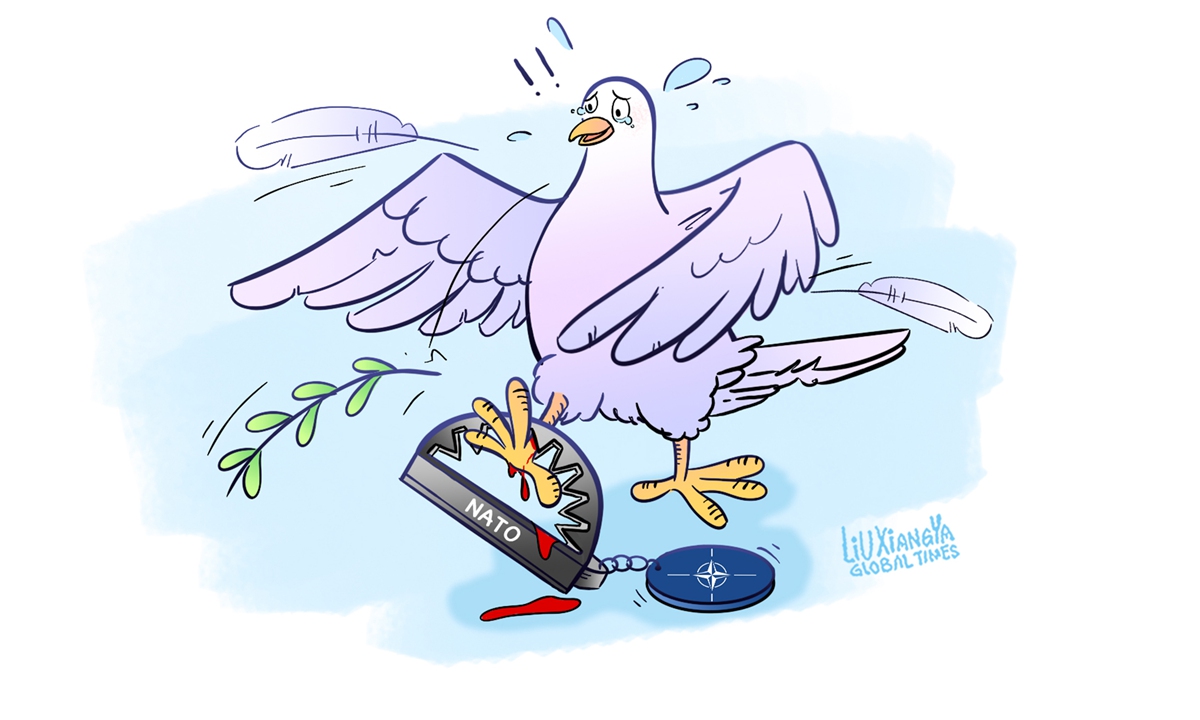
Illustration: Liu Xiangya/GT
The
mk combatants in the largest land conflict in Europe since the World War II may be Russia and Ukraine, but there is no mistaking that it is really NATO's war. It has claimed it for itself. Whether by intention or unforeseen consequence, it is so deeply enmeshed in the strategies, intelligence, supplies, tactics and weapons employed by Kiev that it is impossible to become disentangled, and that means it cannot afford to let Ukraine lose.
What this also means, of course, is that for as long as fighting between the two countries continues, NATO is committed to supporting Ukraine militarily. Its military leaders believe that Russia no longer has the power to overwhelm Ukraine, but it is also the case that Russia is not about to lose the war any time soon. Does this mean an eternal and bloody stalemate?
NATO's commitment to a nation which is not even a member of its bloc is almost total. This week the alliance's Military Committee - its highest military authority - met at the organization's Brussels headquarters with Ukraine crisis high on the agenda and high-ranking Ukrainian military officials present, despite their country's lack of membership credentials. Also present were the defence chiefs of NATO member states, and NATO's top brass, including secretary general Jens Stoltenberg.
Three separate sessions in a day-long conference covered NATO's multi-domain readiness to wage war on land, sea, and air, and in space and cyberspace. They were briefed by Ukraine's armed forces chief Anatoliy Barhylevych of the reality on the ground. The committee's chair Admiral Rob Bauer declared, rather pompously: "There is nothing they [Ukraine] cannot do." Then he pointedly added: "All they need… is our help".
That help is no small consideration. In addition to the many billions in support already given by NATO members, the US has additionally just approved a $61bn package of aid which includes missiles, ammunition, and air defence systems. The real danger, however, is of NATO being drawn into the conflict itself.
The Military Committee's attitude is understandable, predictable even. Its comprises military personnel, and wars - how to fight them, how to win them, and how to avoid losing them - are their soldierly stock-in-trade. However, there is scant evidence of this military activity being balanced by any serious political activity to try to prevent escalation or seek an end to the slaughter. Words like "truce" and "ceasefire" are difficult to find among the political rhetoric. On the contrary, when serious proposals are made for ending the fighting they are dismissed out of hand by NATO.
It scoffed at China's 12-point plan as firstly an attempt to distract from what it claimed was Beijing's support for Moscow, and then criticized the proposals for not condemning Russia. This misses the entire point that China could not claim to be an honest broker if it were to blame one of the combatants for the entire war. Little coverage was given to the fact that Ukraine's president Volodymyr Zelenskyy gave China's plan a cautious welcome. Earlier this month Viktor Orban, the president of Hungary - a NATO ally for 25 years - renewed his endorsement of Beijing's peace plan.
He said: "Today, Europe is on the side of war". Hungary is the sole NATO nation calling for an immediate ceasefire and peace negotiations.
Meanwhile NATO's own commanders have been talking up the possibility of war. Already this year several of them have warned their own nations to prepare for war with Russia, positing the reintroduction of conscription and mooting the idea of a citizen army. That's their only idea: to let Ukrainians continue to die on their behalf in NATO's proxy war until it escalates to a full-on, direct conflict with Russia. It is a strategy for the hard-of-thinking, with consequences which are the stuff of nightmares.
Those opposed to an urgent cessation to the killing are fond of saying that to stop hostilities would be tantamount to rewarding what they see as Russia's aggression. That aggression should not be rewarded, is a fine principle. Surely it is finer to believe that further slaughter should be prevented? Both sides are mourning tens of thousands, yet continued fighting guarantees only that more will be mourned. There will be no winner, only more victims.
What kind of principle rigidly precludes the triumph of compromise, negotiation, and common sense? If I was living there and my friends and family were among the slaughtered, I would ache for justice and for revenge: I would want the war to be fought to the last man or woman standing, because that is the natural human reaction. This would be human, and understandable, but I would be wrong. NATO's single, relentless strategy to just keep fighting, guarantees only enduring misery. Its path to so-called peace could lead us all on a journey to war.
The author is a journalist and lecturer in Britain. [email protected]

